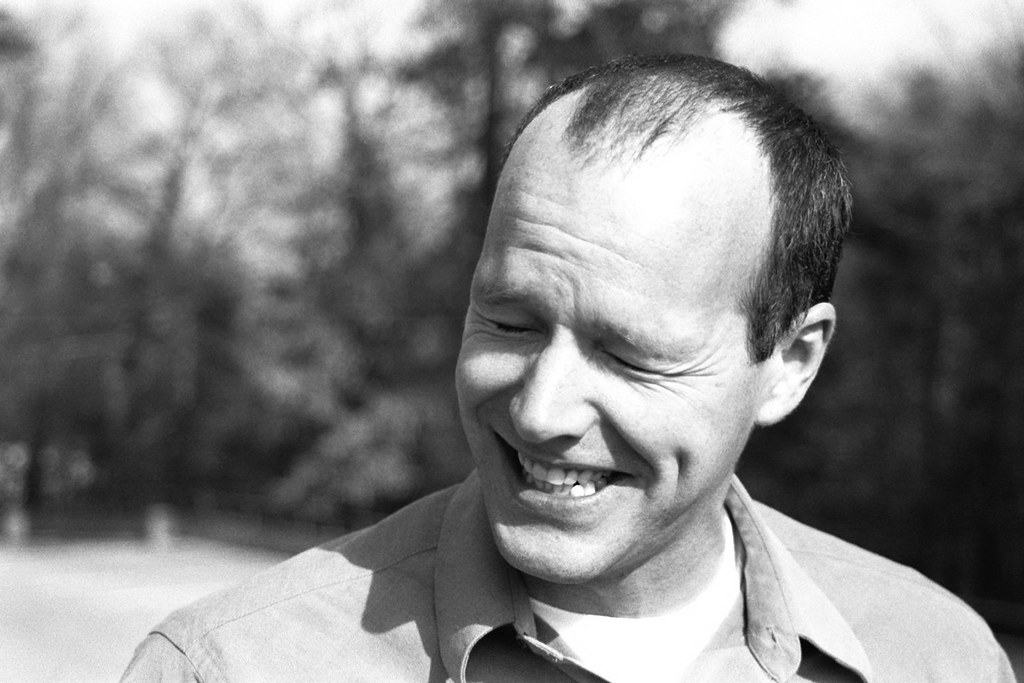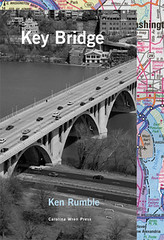Old Introductions: Cole Swensen & Chris Vitiello
5. In The Nature of Things, Francis Ponge asks, “What is the nature of man?” He answers, “Language and Morality.” Few poets are as dedicated to that exploration of the moral use and consequence of language as one of tonight’s readers and my dear friend Chris Vitiello.
6. In Vitiello’s poems, language use is fundamentally a moral question. At its root, language is a lie; the word chair is obviously not a chair. So what, though, does the word chair create? make happen? Is it morally right to accept the falsehood loitering within every word? Questions like these guide Vitiello’s examination of language and morality. By pushing words and phrases that we normally take for granted to their rational ends, he attempts to find language which has an absolute relationship to the thing it represents. What he most often shows us is the uncanny and surreal world that lurks and is created by our words.
7. He writes in Irresponsibility, “Am I supposed to write that it rained? // One, two, three, four, five, six // What rained?”
8. Chris Vitiello lives in a plum colored house in Durham with Vicki and Iris Vitiello. He is the author of Nouns Swarm a Verb published in 1999 and was a founding editor of one of the 90s most highly esteemed literary journals, Proliferation. He earned an Master of Fine Arts degree from the Naropa Institute in Boulder, Colorado. He is currently a member of the Lucifer Poetics Group and the head, though he will deny it, of a poets’ theatre group called The Theatre of Consecutive Thinking. His range of interests and projects is too long to list but they include home repair, automatic flip clocks, Marcel Duchamp, pin-hole photography, bird watching, letterpress printing, Romanian folk music, modern dance, cinematography, the work of Matthew Barney, cooking, and a semi-annual writers’ retreat called “working vacation.”
9. Vitiello’s most recent poetic project is a work titled Irresponsibility. The question that predicates the book is whether or not the writing of poems is a morally responsible act. From this question, he turns his intellect to consider the way language and poems represent nature, human relationships, poetry, art objects, and language itself, how, finally, language reveals only itself.
10. Like language, “The coverage of the taxi explosion / shows the exploded taxi” and “To see the wind I look at a tree” and “You shouldn’t have to fight boredom” and “Writing this erases what it actually is” and “I see this: The puddle’s reflection of trees against sky repeatedly jitters and stills / I say this: ‘It is raining.’”
11. His quest is always to find something real in language, to find something other than words below words. In this drive, Vitiello is a sort of a rational mystic and poems serve as a set of instructions to guide himself and his readers to actual life beyond the page. He writes, “This is a poem / The poem happens outside the poem // Poems happen outside / poems / //Poems aren’t / poems.”
12. It is not clear if it is possible, in these poems, to escape the endless and fantastic maze that our words make for our minds, because of course, we can only describe the means of that escape with more words.
13. Vitiello writes, “The car is smoking / I knew / the car smokes / All you have to do is pay attention and it’s not that simple.”
14. Please welcome Chris Vitiello.
15. “The world is beautiful and now it is a single thing and this renders it silent so that the light can pass through in any direction, altering the nature of motion, and everything that moves is newly legible though unsayable; one said it would be possible but another turned around quickly and is still turning.”
16. The unsayable, the indescribable, the world beyond words, without terms: the paradox of describing beauty so profound that it is beyond description: this is the territory Cole Swensen seeks to enter in her poems, as a geographer of unspeakable wonder.
17. “There is indeed the unspeakable, and it can’t show itself; this is the real.”
18. A finalist for the National Book Award in 2004, the author of nine collections of poetry, a translator of contemporary French poets, winner of at least five other prestigious literary awards, member of the Iowa Writers’ Workshop faculty, and political activist.
19. “Landscape is light alone. Some white coming up from behind which like a pendulum will come to entrance” and “I saw someone leaving / and I saw the world, which was meant only for background, come to life” and “into the blazing city // that all the white boats are leaving, a city sailing / into ages, please repeat: // 1) The city is white / 2) Most cities are white / 3) The white thing you see if you turn around quickly // often far away, often far out to see, though at time across a plain, a shimmer, or as if silt falling, fine-grained, a counting sand, a seed well-timed”
20. Light, in these poems, is our teacher, is that which makes everything possible. Light as an ally, the unifier; lighting, lightning, the state to which Swensen asks us to aspire.
21. “Land becomes art through applied joy and shock” and ““The natural extension of the hand / is the world is / reflected in its proper motion.”
22. Humanity in its highest state: the world and of the world. The poems uncover the work of painters, inventors, scientists, philosophers, the moments when we reach into the real, unsayable world and bring something back into life.
23. “Walking unravels the muscle that connects / the earth to bone, / feathers it out like a braid unskeined, / the leaves never fall straight down, even / when you think not one bit of air is moving” and “Philolaus the Pythagorean who believed / the sun a vitreous body / oddly / built of cast-off centuries with all their pictures in place” and “Poussin: the angel is still there but Joseph looks back at her in fear while Mary simply looks back and the child, simply, at us. Behind it all, an impossibly intricate world that turns the sun blue.”
24. Humanity, in these poems, as the recipient, creator, and beneficiary of beauty of creation, humanity in the singular.
25. “Face after face across this expanse. Extend and turn. If you turned around you’d be facing a forest” and “the face that underlies a landscape is only perceptible from a train. Einstein knew this and ‘the world has a face that looks back at you, and it is your own.’”
26. Cole Swensen is a humanist, a historian and celebrant of human achievement, an archeologist of the undeniable, inevitable recurrence of beauty in us and in the world.
27. “We begin with the proposition that the world is beautiful” and ““You can now see the world as a single streak, something built of transparent speed; pure white of the sort they say no one person, unaided, can perceive.”
28. Please welcome Cole Swensen.



0 Comments:
Post a Comment
<< Home